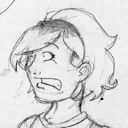I would love to say that the bottom-clenching dedication I
have been known to display towards correct running-order in my section at work
extends to my own personal collection. Really, I would.
Unfortunately, that would be a white lie. Or an untruth.
Ok, a complete whopper.
The maths is simple:
(26 years of almost continuous reading + shelf-space
equivalent of about 3 Billy Bookcases) x 1 off-duty bookseller = a total mess
As a result, when the tectonic shifts in the array of books
directly above my bed lead – as they often do – to an avalanche (bookslide?),
it is just as likely that I will be woken up by a John Klassen picture book
(light, but sharp) to the neck as it is that I will instead be roused by a
Graham Greene hardback (blunt, but extremely forceful) to the face. I call it
my bibliogralarm and it never fails to surprise.
(On a not-unrelated note, I have had to remove this book of
postcards featuring hirsute gentlemen of the 1970s from the shelf in question.
It’s just too terrifying a wake-up call.)
A slightly less painful side effect to my blatant disregard
of the laws of both alphabetisation and the Dewey Decimal System is that books that I associate with
each-other tend to stick together, regardless how tenuous the thread.
Such a thread links The
First Wives Club by Olivia Goldsmith, The Queen and I by Sue Townsend, The Stephanie Plum series by Janet Evanovitch and, incongruously, Lady Chatterly’s Lover by D.H. Lawrence.
These books can be found huddling together on one shelf because, when reading
them in my pre- teen years, I discovered that they all shared one common
feature: S.E.X.
Let's play odd one out...
Though varying wildly
in style, tone and explicitness, they taught me what my science teacher
had yet to work up to courage to tell us. Most children learn about the birds and the bees through a confusing amalgamation of medical diagrams, gabbled parental speeches and what is often ominously referred to as The Street.
Although it took me another term or so to be able to confidently label an anatomic chart (the names I had learnt were somewhat more libidinous and to be used within the school confines at my peril), the frank descriptions afforded in my reading material assured me a working knowledge of the ins and outs of the process, so to speak.
Pre-teen inquisitiveness appeased, the books in question came to rest beside each other on my bookcase. As the book-tide ebbs and flows around my room, they remain together, reminding me of how I worked out the mechanics of sex whilst drawing unwise and frankly bizarre associations between the reproductive act and guns, gardeners, big hair and communist revolutions.
Although it took me another term or so to be able to confidently label an anatomic chart (the names I had learnt were somewhat more libidinous and to be used within the school confines at my peril), the frank descriptions afforded in my reading material assured me a working knowledge of the ins and outs of the process, so to speak.
Pre-teen inquisitiveness appeased, the books in question came to rest beside each other on my bookcase. As the book-tide ebbs and flows around my room, they remain together, reminding me of how I worked out the mechanics of sex whilst drawing unwise and frankly bizarre associations between the reproductive act and guns, gardeners, big hair and communist revolutions.
The ingredients to sexual chemistry, by Siouxsie Pimm, aged 12 3/4
In the weeks and months ahead, it is likely that I will
return to the bizarre juxtapositions of my books as fodder for the ever hungry ‘subject’
field of this blog. However, for the time being I leave you with the pleasing
thought that should a Marxist revolution championed by armed gardeners with
1980s hair occur, my agenda may differ somewhat from that of the rest of the
population.











No comments:
Post a Comment